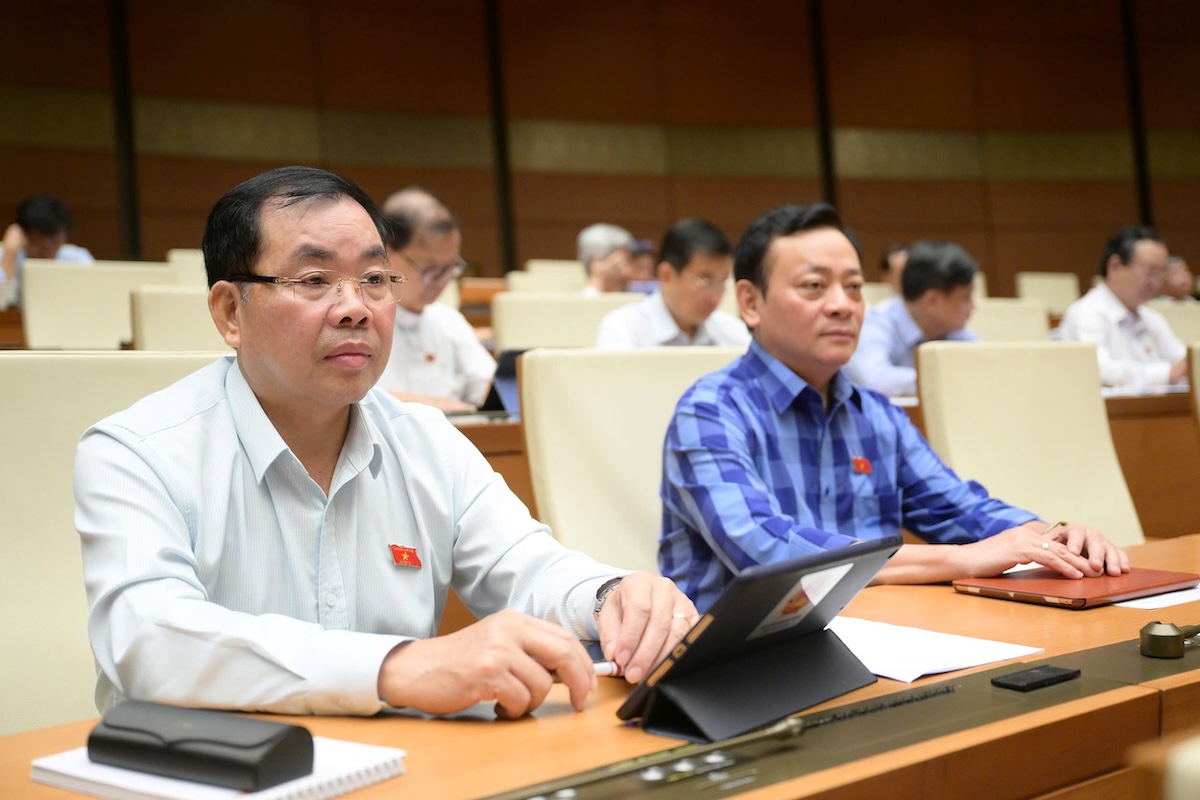On 25/6, the National Assembly passed the amended Budget Law with nearly 90% approval.
This new law empowers the government to adjust the national budget, a responsibility previously held by the National Assembly.
Specifically, the government will now draft adjusted budget estimates in cases of fluctuations that increase borrowing or budget deficits beyond the allocated estimates, and submit these to the National Assembly for approval. Based on the National Assembly's resolution, the People's Committees at all levels will then create adjusted local budget estimates and submit them to the corresponding People's Councils for decision.
The government will also decide on adjustments to the estimated revenues and expenditures of certain ministries, sectors, and localities. However, these adjustments cannot increase the total borrowing or budget deficit and must be reported to the National Assembly Standing Committee and the National Assembly at the nearest session.
The law also expands the Prime Minister's authority in developing socio-economic development plans and the national budget estimates for the following year. Based on National Assembly resolutions, the Prime Minister will decide on the detailed allocation of budget revenues and expenditures for each ministry and sector. This includes development investment expenditures for education, training, vocational training, science, technology, and innovation, as well as recurring expenditures for each field. The Prime Minister will also decide on the detailed allocation of unallocated amounts and the use of the central budget reserve.
In his report to the National Assembly before the vote, Finance Minister Nguyen Van Thang explained that granting the government the power to adjust the budget aims to increase decentralization and delegation of authority. He emphasized this as an urgent issue needing immediate resolution to meet practical demands, enabling proactive budget management, reducing administrative procedures, and increasing accountability at all levels.
The National Assembly, the government, the Prime Minister, and local authorities will increase inspections, supervision, and impose strict penalties for violations, negativity, and waste.
 |
Delegates listen to Finance Minister Nguyen Van Thang's report before voting on the amended Budget Law, morning of 25/6. Photo: National Assembly Portal |
Delegates listen to Finance Minister Nguyen Van Thang's report before voting on the amended Budget Law, morning of 25/6. Photo: National Assembly Portal
Another key change in the law is the adjustment of principles for revenue sharing and allocation between the central and local budgets. This allocation aims to ensure local governments have sufficient resources to fulfill their assigned tasks.
The central budget will receive all revenues from import-export taxes, excise taxes on imported goods, corporate income tax, profits shared with the host country, and other revenues from oil and gas exploration and exploitation.
The central government will also retain 100% of the supplemental corporate income tax to combat global tax base erosion, from foreign suppliers and radio frequency allocation.
Several tax revenues will be shared between the central and local budgets according to set ratios. These include corporate income tax (excluding portions from oil and gas exploration and the supplemental tax against global tax base erosion); personal income tax; excise tax; environmental protection tax.
For revenues from mineral and water resource exploitation rights, the central budget will retain 70%, while localities will receive 30%. Similarly, the VAT sharing ratio (excluding refunded amounts) between the central and local budgets is also 70-30%. The National Assembly Standing Committee will review and decide the specific allocation for each locality.
Regarding land use and lease fees, Hanoi will receive all such fees under the Capital Law. Localities not receiving additional local budget allocations will receive 80%, and the central budget will receive 20%. For localities receiving supplemental budget balancing, the sharing ratio between the central and local budgets is 15% and 85%, respectively.
The amended law also mandates the government to manage and administer the use of revenue exceeding estimates and the remaining expenditure estimates of the central budget. Provincial and city People's Committees will manage their respective local budgets in a similar manner. The government will report the implementation results to the National Assembly Standing Committee and the National Assembly at the nearest session.
The law also increases the responsibility of unit heads in budget expenditures, simplifies the State Treasury's budget expenditure control process, and removes the priority order in handling revenue exceeding estimates.
The financial reserve fund can be used for temporary advances for important infrastructure projects to accelerate implementation, with repayment required within 36 months from the advance date. Total advances cannot exceed 50% of the fund's beginning-of-year balance, ensuring flexible and effective use of the provincial financial reserve fund.
The amended Budget Law has 79 articles and will take effect from the 2026 budget year. Regulations on budgeting, state budget compliance, and provincial and communal-level allocation for science, technology, innovation, and digital transformation will take effect from July 1st.
The 2024 budget settlement and the 2026 budget estimation process will still follow the 2015 Budget Law.
Anh Minh












